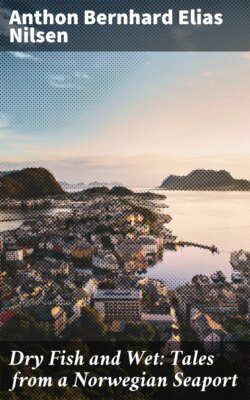Читать книгу Dry Fish and Wet: Tales from a Norwegian Seaport - Anthon Bernhard Elias Nilsen - Страница 6
На сайте Литреса книга снята с продажи.
Оглавление"Whene'er these humble lines you see,
I pray that you'll remember me."
and one from Miss Tobiesen, an old lady at the infirmary, who had been engaged seven times, and therefore judged it appropriate to quote:
"'Tis better to have loved and lost
Than never to have loved at all."
Amanda then insisted that her father should contribute something, but Bramsen declared in the first place that the album was much too fine a thing for his clumsy fist, and furthermore, that he couldn't hit on anything to write. Amanda, however, gave him no peace till he consented, and at last, after much effort, the worthy man achieved the following gem:
"I, Amanda's only father,
Love her very much but rather
Fear she causes lots of bother
To her wise and loving mother."
This elegant composition was unfortunately not appreciated by Amanda, who, to tell the truth, was highly displeased. Fancy writing such a thing in her book—why, the whole class would laugh at her. Bramsen was obliged to scratch it out, but in so doing, scratched a hole in the paper, leaving no alternative but to take out the page altogether, much to Amanda's disgust.
Bramsen's highest ambition in life was to be master of a steamboat; not one of the big vessels that go as far as China, say, or Copenhagen—that, he realised, was out of the question, in view of his large contempt for examinations, mate's certificates and book-learning generally. The goal of his desire, the aim of all his dearest dreams, was a tugboat, a smart little devil of a craft with a proper wheel-house amidships and booms and hawsers aft.
A grand life it would be, to go fussing about up and down the fjord, meeting old acquaintances among the fishermen and pilots—yo, heave ho, my lads! He had often suggested to Andrine that the contents of the savings-bank book might be devoted to the purchase of a tug, but Andrine would cross herself piously, and urge him to combat all temptation and evil inspirations of the sort. Bramsen could not see anything desperately evil in the idea himself; he found it more depressing to think that he should spend the remainder of his days in the stuffy atmosphere of the warehouse on the quay. Was it reasonable, now, for a man like himself to be planted, like a geranium in a flower-pot, among sugar-boxes, flour-sacks, and store-keeping trash?
"Ay, life's a queer old tangle sometimes," murmured Bramsen to himself, "and we've got to make the best of it, I suppose." And he cast a longing glance through the doorway of the shed, at Johnsen, of the tug Rap, steaming down the fjord with his tow.
